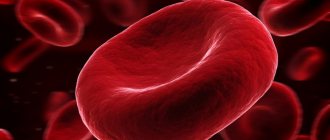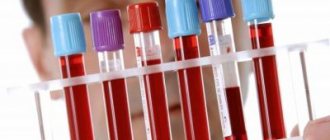HCG diagnostic methods
To determine this hormone, high-quality reagents are used. The further correct tactics of doctors’ actions depend on determining its concentration. Therefore, ultra-precise research methods are used to diagnose it. Moreover, the more accurate the method, the more different factors that influence the final diagnostic result. Thus, when donating this hormone, it is necessary to comply with all conditions both at the stage of preparation and donation itself, and during laboratory testing of blood plasma.
The importance of hCG for a woman’s body
Normally, this specific hormone in the female body is produced only by the tissues of the embryo. In the formation of hCG during pregnancy in the first weeks, the main role is played by the chorion, which is the membrane of the embryo that provides its nutrition. After three months of pregnancy, this membrane turns into the placenta, and the hormone they produce constantly circulates in the vascular bed, changing its level depending on the duration of pregnancy.
HCG in its chemical structure consists of two types of amino acids. The first type (Alpha) has a similar structure to gonadotropic hormones, which control the formation of female sex hormones and ensure the cyclicity of the menstrual cycle. The second type (Beta) distinguishes hCG from the molecular structure of other hormones.
For the female body, hCG plays a very important role during pregnancy. It regulates the level of most hormonal substances involved in the development of pregnancy. This hormone is not controlled by the hypothalamic-pituitary regulation. It ensures the production of progesterone by the corpus luteum, maintains pregnancy and maintains the desired concentration of female sex hormones even in the absence of ovulation and follicular growth. Women need to know that beta-hCG is administered during pregnancy. Therefore, the necessary analysis is called a blood test for beta human chorionic gonadotropin. Accordingly, a woman should know when to take hCG.
Conditions under which an hCG test is taken:
- Prolonged absence of menstruation (amenorrhea of various origins);
- Determining the duration of pregnancy, starting from 7 days after conception;
- Determination of pathological conditions during pregnancy (ectopic, frozen and multiple pregnancies, threat of spontaneous miscarriage and premature birth);
- The presence of remnants of placental and embryonic tissue during a poorly performed medical abortion and incomplete spontaneous miscarriage;
- Screening tests at critical stages of pregnancy (absolutely all pregnant women donate blood for hCG at 12-14 weeks of pregnancy and at 17-18 weeks);
- Prenatal diagnosis of congenital malformations of the fetus. The information content of this study involves taking hCG simultaneously with blood tests for alpha-fetoprotein (AFP) and estriol;
- For the differentiation of malignant neoplasms that consist of chorionic tissue, gastrointestinal tract, ovaries and testicles.
What is hCG?
HCG is a protein made up of two units.
Alpha particles of the hormone are similar to biologically active substances secreted by the pituitary gland. Beta particles are unique. The mass of the CG molecule is approximately 46 kDa. During pregnancy, the glycoprotein is synthesized in the placenta. The biological properties of hCG are in many ways similar to the properties of other hormones: luteinizing and follicle-stimulating. In some malignant diseases, tumor cells begin to produce hCG. In a non-pregnant woman and a healthy man, the hormone is practically absent in blood tests. In obstetrics and gynecology, the b hCG test, along with ultrasound, is used to monitor pregnancy throughout the entire period. Deviations in the test results are grounds for further examination and require consultation with a geneticist. An artificial increase in hCG levels is used in the IVF process. As a result of hCG injections in women, the maturation and release of the egg is stimulated, and the production of estrogen and progesterone increases. In men, the administration of exogenous hCG activates the growth of sperm count.
It has been proven that the substance also has the properties of a corticotropic hormone. HCG affects the adrenal glands, stimulating the synthesis of steroids in their cortex. Thus, it is involved in preparing the pregnant woman’s body for the upcoming physiological stress. Since the fetus is perceived as foreign by the mother's body, its normal development requires some immunosuppressive effects of hormones, including hCG.
HCG promotes the maturation of placental tissue. Thanks to it and other hormones, its functional activity increases and the number of chorionic villi increases.
Without the hormone, normal development of the embryo is not possible. HCG ensures the production of estrogen and progesterone, and also maintains their balance in the body of the expectant mother. Therefore, any pregnancy support program always contains regular tests for hCG levels.
Basic rules for taking a blood test for hCG
This study should be carried out preferably early in the morning on an empty stomach. Drinking alcoholic beverages and smoking is prohibited 7-8 hours before the test. It is also necessary to avoid various psycho-emotional and physical overloads, as these factors can affect the information content of the study. Therefore, women who are preparing to take an hCG test need to be extremely careful and follow all the rules and recommendations regarding this study. Failure to follow the recommendations may lead to false positive or false negative results, which will mislead the doctor and the patient.
Reference values and interpretation of the obtained data
Reference values for human chorionic gonadotropin depend on gestational age. In the case when this hormone is detected in the vascular bed of a non-pregnant woman, or in men, over 5 mU/ml, this indicates the presence of pathological processes in the body.
During a normal pregnancy, a gradual increase in the level of hCG in the blood is observed. During the first 12 weeks of pregnancy, this hormone increases most rapidly. During this period, the hCG level doubles every three days. The maximum increase in beta hCG is observed at 12-13 weeks of pregnancy, when the chorion is transformed into placental tissue. This high concentration remains in the blood for two weeks. Then the level of this hormone slowly decreases to certain constant values, which remain until delivery.
Types of tests for hCG
Blood test for hCG (beta particles)
Measuring total hCG is the most reliable way to diagnose and monitor pregnancy. Other indications for the test include menstrual irregularities, trophoblastic tumors, and in men, testicular malignancies.
Urine test for hCG (beta particles)
Compared to blood, the urine of the expectant mother contains less of the hormone. Therefore, determining the concentration of a substance in urine can diagnose pregnancy only from 8-10 days. Like laboratory testing, pharmacy tests are also based on the determination of hCG in urine. Home tests have a lower sensitivity threshold than laboratory tests, and, accordingly, a lower degree of reliability. Their positive result requires a visit to an obstetrician-gynecologist to confirm a normal pregnancy.
Test for free hCG (beta-hCG subunit)
The range of application of this test is quite wide. In oncology, it is in demand as a marker of malignant tumors. Measuring the number of independent hCG particles in the blood is informative regarding testicular cancer in men. In addition, this indicator is important in the diagnosis of trophoblastic tumors in women. It is included in pregnancy screenings 1 and 2. The study helps assess the risk of such congenital fetal pathologies as Down syndrome and Edwards syndrome.
The main reasons for increased hCG levels
Exceeding reference values in pregnant women may indicate:
- Multiple pregnancy (hCG levels increase in accordance with the number of embryos);
- Preeclampsia at different stages;
- The occurrence of gestational diabetes mellitus;
- Chromosomal aberrations and defects in intrauterine development of the fetus (various developmental anomalies, Down syndrome);
- Incorrect gestational age determined by ultrasound examination and date of last menstruation;
- While taking natural progesterone medications.
An increase in hCG levels in the absence of pregnancy may indicate:
- The presence of malignant neoplasms of the testicles, ovaries, uterus, gastrointestinal tract, etc.;
- Embryonic tumors such as choriocarcinoma, chorioepithelioma, hydatidiform mole and its relapses;
- While taking medications containing human chorionic gonadotropin;
- After a full medical abortion within a month or with an incomplete abortion at any time after it.
Reasons for decreased hCG concentration:
- Frozen pregnancy;
- Ectopic pregnancy localized anywhere;
- Retarded intrauterine growth and development of the embryo and fetus;
- Threat of premature birth or spontaneous miscarriage;
- Fetoplacental insufficiency and premature aging of the placenta;
- Post-term pregnancy;
- Antenatal fetal death in the third trimester of pregnancy.
Women need to consult a specialist with the results of the examination. If there is any doubt about the correctness of the analysis, it should be retaken after two or three days.
HCG during pregnancy
The concentration of the hormone increases from the moment of conception, its peak is reached in the second month of pregnancy. HCG promotes the synthesis of a number of hormones that are necessary for the normal development of pregnancy and protects the baby from the immune reaction of the mother's body. After the placenta is formed, the need for large amounts of this hormone disappears, and its level decreases. During the second half of pregnancy it remains constant.
Reference hCG values depend on the stage of pregnancy. Tables have been developed that allow you to monitor the level of this hormone. If there are deviations in any direction, it is recommended to undergo a comprehensive examination. Such deviations may indicate a high risk of miscarriage or premature birth, severe fetal pathology. Modern medicine in many cases is able to cope with problems, but only if they are identified in a timely manner. Therefore, it is important that the woman is under the supervision of a doctor throughout the entire period of bearing the baby.
Alternative ways to determine hCG in the body
Quick diagnosis of pregnancy is based on identifying the level of human chorionic gonadotropin in a woman’s urine. This is the essence of a pregnancy test. This rapid diagnosis of pregnancy involves examining morning urine. Currently, all pregnancy tests have a very high sensitivity, which makes it possible to find out from the first days of a missed period whether a woman is pregnant or not. The information content of this analysis is significantly lower compared to the study of blood plasma. These methods for determining hCG have different purposes, which helps to complement the results obtained. Thus, you cannot replace one method with another. However, the cost of these studies varies markedly.
Therefore, it is necessary to correctly combine these methods for determining the concentration of hCG. If pregnancy is confirmed, a woman can use a regular pregnancy test. When the test confirms the presence of pregnancy, but there are clinical symptoms of a pathological course of pregnancy, the pregnant woman needs to take a blood test to determine the concentration of beta-hCG. Thus, it is possible to identify an ectopic pregnancy or a pathology of pregnancy development. Experts recommend determining the fact of pregnancy with a regular test, and not with a venous blood test.
This blood test is an accurate research method for diagnosing the pathological course of pregnancy. Thanks to its informative content, it is possible to prevent the development of a negative pregnancy outcome and early diagnosis of various neoplasms.
When should you take a β-hCG test?
For women:
early diagnosis of pregnancy; prenatal screening of fetal development pathologies; amenorrhea; diagnosis and control of treatment of trophoblastic pathologies; dynamics of chronic placental insufficiency; suspicion of threatened spontaneous abortion or frozen pregnancy; suspicion of ectopic attachment of the embryo; monitoring the course of pregnancy over time; control over the implementation of artificial abortion. For men:
differential diagnosis of testicular tumors.








